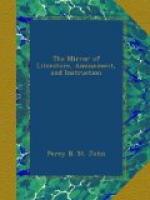fakes then! I believes not,” says I.
“Why, then, Tim,” says he, “you must
run and drive him in directly, for it’s a mortal
could night.” “And where is he, father?”
says I. “In the far field, at the other
side of the ould church,” says he.
“Murder!” says I, for I didn’t like
the thoughts of going near the ould church
at all, at all. But there was no use in saying
agen it, for my father (God be merciful to him!)
had us under as much command as a regiment of soldiers.
So away I went, with a light foot and a heavy heart.
Well, I soon came to the bounds’ ditch between
the farm and the berrin ground of the ould
church. Then I slackened my pace a little, and
kept looking hither and over, for fear of being taken
by surprise. The moon was shining clear as day,
so that I could see the gray tombstones and the white
skulls; when, all at once, I thought one of them began
to move. I could hardly believe my two eyes;
but, fakes, it was true enough; for presently it came
walking down the hill, quite leisurely at first, then
a little faster, till at last it came rolling at the
rate of a fox hunt. “Twill be stopped at
the bounds’ ditch,” thinks I; but I was
never more out in my reckoning, for it bowled fair
through the gap, and made directly up to me. “By
the mortal frost,” says I, “I’m
done for;” and away I scampered as fast as my
legs could carry me; but the skull came faster after
me, for I could hear every lump it gave against the
stones. It’s a long stretch of a hill from
the berrin ground down to the road; but you’d
think I wasn’t longer getting down than whilst
you’d be saying “Jack Robinson.”
Sure enough I did make great haste; but if I did,
“the more haste the worse speed,” they
say, and so by me any how, for I went souse up to my
neck in a dirty Lochaune by the side of the
road. Well, when I recovered a little, what would
I see but the skull at the edge of the Lochaune,
stuck fast in a furze bush, and grinning down at me.
“Oh, you’re there,” says I; “I’ll
have one rap at you any how, for worse than die I can’t;”
so I up with a lump of a blackthorn, I had in my fist,
and gives it a rap, when what should it be after all,
but a huge rat, which had got into the skull, and,
trying to get out again, it made it to roll down the
hill in that frightful way. To be sure,’
said Tim, ’to be sure it was mighty frightful,
but it wasn’t a ghost after all; and, indeed,
(barring that) I never saw any thing worse than myself,
though we lived for a long time near the ould
church of Aghadoe.’”
This is all we can spare room for at present. The second volume is untouched, and will afford us a few extractable pieces—but they must be short. We have heard of all stages of laughter—as being convulsed—ready to burst—splitting sides—and if our readers promise not to die, in due order, with laughter—we may probably recur to Mr. Croker’s very tickling volumes.
* * * * *




